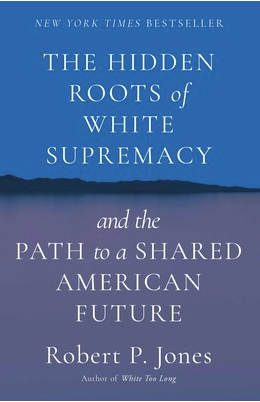Book Review: “The Hidden Roots of White Supremacy”
by Robert P. Jones

The Hidden Roots of White Supremacy
by Robert P. Jones
Simon and Schuster, 2023
In his latest book, The Hidden Roots of White Supremacy, the author, Robert P. Jones, expands the subject of his earlier book, White Too Long: The :egacy of White Supremacy in American Christianity, which dealt with slavery and black racism.
In this book, he adds Native American racism, then goes even deeper to the historic Christian documents that have infected not only Christian teachings but also have been fundamental principles embedded in laws, policies, decisions, and cultures ever since to the present. His research and documentation are extensive, unnerving, and compelling reading.
As enslaved Black peoples were being imported to do the backbreaking labour of clearing, planting, and harvesting the land, simultaneously, Indigenous peoples were being removed from and murdered for the land. All so white people could become wealthy on ‘free land through free labour.’ Whenever Blacks and Indigenous people achieved economic prosperity and began expecting recorded principles in the Constitution and treaties might be honoured, this became intolerable to white people.
Jones puts three deadly episodes in Native American history in 3 states alongside three deadly episodes in Black history in that same area. Not only does he show their similarities but also how underlying principles justified the white governments’ and white peoples’ atrocious behaviour. Divine authority invested in Popes and then delegated to monarchs was enshrined in the papal decree, the Doctrine of Discovery of 1493, which marked the beginning of sustained European contact in North America.
Discovery gave exclusive land titles to whoever placed a flag, justifying systemic violence to seize it. Basically, the Doctrine said white people and Christianity were superior, the land was deemed ‘empty,’ and all indigenous people were deemed less than human, dispensable. This Doctrine brought to America the religious and cultural worldview of Manifest Destiny: the sense of divine entitlement, of European chosenness – America a new Zion.
Jones clearly sets out how this shaped the worldview of most Americans, influencing events, policies, and laws throughout its history. As it had already done regarding slavery, it also set the legal standard for how the US dealt with its Native population, shaping US and international laws today.
This current moment of fraught and contested heritage is resulting in new practices of remembering: reckoning with mistakes made, commemorating forgotten victims, and imaging paths not taken, he says. Sadly, as always happened historically, when any non-white minority made any significant progress, it also resulted in visceral, sometimes violent resistance.
We must acknowledge, Jones writes, that not only has Christianity seemed incapable of defeating white supremacy, but worse, it’s been pressed into its service. We must also see the lingering power of centuries-old settler-colonial values that justified the murder and exile of Indigenous people and attracted planters who enslaved Africans with justified white violence.
Remembering and truth-telling are neither ends in themselves nor acts of self-flagellation nor avenues of cheap absolution for the guilty consciences of White Americans. Rather, both confession and memorialization are powerful rituals that can rehabilitate and kindle moral and religious imaginations, helping us really see both our past and present and reorient us in the vital repair towards charting a new path, he says.
Words of repudiation are easy. It’s quite another thing to acknowledge the serious impact still present in policies and laws and then change them. Never mind, make ‘reparations’. Locally, far too many people still have no idea about the Doctrine or ‘broader’ USA history. Indigenous people are negative ‘historic figures.’ Black people can’t be ignored since they’re still ‘around,’ but their narrative is ignored/denied.
Progressive Christians often quote Amos, “Let justice roll down as waters and righteousness as a mighty stream.” Jones suggests this is a naive understanding of social change, as though past injustices and current powerful oppressive systems, when confronted with facts, will naturally experience catastrophic failure, like a dam breaking. It’s an unrealistic hope that confession will release a flood of justice that mysteriously, powerfully washes away the old and makes all things new. There is no struggle, conflict, or cost to the powerful, and no people are required as change agents. He says it’s neither a Black nor an Indigenous Problem but a White Christian Problem.
“While we are endlessly creative in fashioning novel ways to kill, dispossess, and defraud others, we are hopelessly unimaginative in our efforts to balance the scales of justice. Greed spawns a million schemes, while repentance throws up its hands… The creativity of our solutions is directly proportional to, and a measure of, the strength of our convictions.”
In his hopeful conclusion, he recognizes “White Christians no longer represent the majority of Americans, are no longer capable of setting the nation’s course by sheer cultural and political dominance. But there are still more than enough to decisively derail the future of democracy in America.”
He writes, “It’s a matter of choice.” (reminding me of Deut 30:19 – I set before you life and death, blessings and curses. Oh that you would choose life….) “If we choose democracy, it will require more than just confession by an unflinching few. It will require joining the work already underway (in grassroots Indigenous & Black groups) to repair the damage done by this malignant cultural legacy.” grassroots Indigenous & Black groups) to repair the damage done by this malignant cultural legacy.”
~~~~~~~~~~~~~~~~

